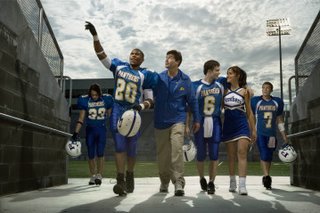 This morning's column reviews one of my two or three favorite new shows (and, considering that I've seen a second episode of this and not "The Nine," it may have shifted into favorite position), "Friday Night Lights":
This morning's column reviews one of my two or three favorite new shows (and, considering that I've seen a second episode of this and not "The Nine," it may have shifted into favorite position), "Friday Night Lights":At one point in the debut episode of "Friday Night Lights," we see the teenage quarterback of the Dillon Panthers fade back to pass. He evades one tackler, then another, and then...
... well, that would be telling, wouldn't it? But when it comes to fictional sports stories, does that matter? Or is the knowledge of what's to come part of the point?
With real sporting events, the rush comes from the unpredictability, the way that a game refuses to follow a script. (Save for the occasional New Orleans Saints return to the post-Katrina Superdome.) If there weren't the possibility of witnessing failure, what fun would success be?
And yet there's a reason why sports movies remain so popular, why four different football films are being released this fall, why Sylvester Stallone is sucking in his gut and lacing on the gloves for a sixth "Rocky" movie. The thrill of victory may be sweeter if you risk the agony of defeat, but sometimes we just don't want to suffer, do we?
The best sports movies and TV shows provide us with a kind of certainty, the knowledge that you'll get to witness either a clear win ("Hoosiers," "Major League") or some kind of moral victory (Rocky going the distance, Rudy getting on the field).
So when I say that virtually every development in the "Friday Night Lights" premiere will be telegraphed well in advance, I don't mean it as a bad thing. The drama is one of the season's best because it makes you care even when you know something big is coming -- and because it finds pleasant little surprises along the way.
To read the rest, click here.
UPDATE: Might as well use this to get other points of view rather than starting a second FNL thread. What say you?
















No comments:
Post a Comment